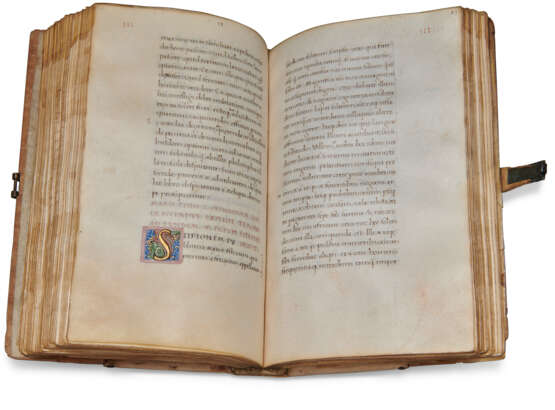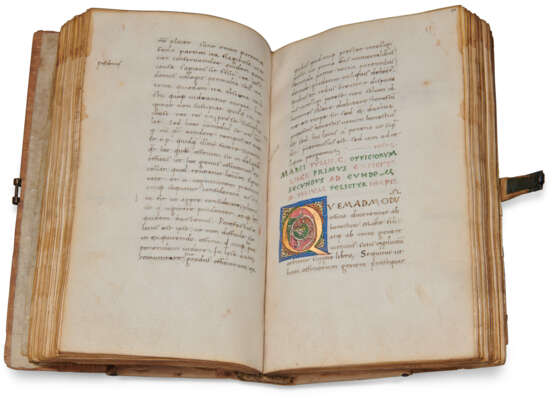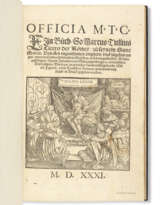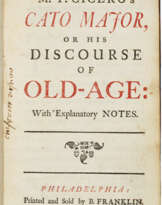ID 993296
Lot 49 | Marcus Tullius Cicero (106-43 BCE) and Caelius Rhodiginus (1469-1525)
Estimate value
£ 40 000 – 60 000
Antiquae Lectiones (excerpt), De Officiis and Somnium Scipionis, in Latin, illuminated manuscript on vellum [Venice, third quarter 15th century]
The quintessential Venetian humanist manuscript: two seminal texts by the great Roman politician and orator Cicero, introduced by a contemporary excerpt from the Venetian humanist Lodovico Ricchieri’s Antiquae lectiones (here on Ciceronian rhetoric), written by at least six different humanist scribes, and produced for the Calbo family of Venice (most likely the humanist Antonio Calbo, count of Sebenico).
213 x 134mm. 132 leaves, complete: 12, 2-1410, modern foliation 1-130 followed here, catchwords survive, 24 lines until f.50, 23 lines thereafter, ruled space: c.140 x c.70mm., headers in red on the top corners of rectos and versos throughout, and sporadically in red or black in centre of the upper margins, at least 6 different hands (f.i-ii verso, the excerpt from the Antiquae lectiones, a 16th-century addition; ff.1-27; ff.27-v-37; ff.37v-40v; ff.41-50; and ff.50v-130v), contemporary annotations throughout, initials in red, rubrics in red and green, three illuminated initials, coat of arms of the Calbo family at the foot of f.1 (occasional marginal dampstaining, opening leaves a little darkened, a few wormholes). Modern blind-stamped half vellum over wooden boards, brass catch and clasp with leather strap (some worming to lower board).
Provenance:
(1) Calbo family of Venice: their coat of arms on f.1 quarterly or and gules, in the second a cross fitched argent. Originally from Padua, members of the Calbo family occupied several important political and military roles in 15th-century Venice. Among these was Count Antonio Calbo (c.1439-1505), who enjoyed an illustrious and active political career in Venice, where he occupied all the top offices, including that of procurator of San Marco, and in Sebenico (modern-day Šibenik in Croatia) where he became heavily involved in its humanist cultural milieu, befriending the Latinist Dalmatian poet Giorgio Sisgoreo who described him as ‘tamque praetori et tamque historiae studioso’ (G. Sisgoreo, De visu Illiriae et civitate Sibenici, 1487). On Antonio Calbo, see Archivio di Stato di Venezia, Segretario alle voci, regg. 5, 6, 7, 9; Capi del Consiglio dei dieci. Lettere di rettori, b. 169; Venice, Civico Museo Correr, cod. Cicogna 2832, ms. III, 69 and Cicogna 2889; A. Ventura, Nobiltà e popolo nella società veneta del 1400 e 1500, Bari 1964, pp.187-215; and J. Gudelj, ‘La Loggia di Sebenico e la costruzione dell’identità locale tra Venezia e l’Antico’, Antichità, identità, umanesimo: nuovi studi sulla cultura antiquaria nel Mediterraneo in età rinascimentale (2018), pp. 131-132.
(2) E. Giard and G. Andrieux, Précieux manuscripts, incunables et gothiques rarissimes, 5 December 1931, lot 33.
(3) Eckhard Günther, of Cologne: typed letter by Dr Joachim Vennebusch dated 15 January 1978, mentioning his ex-libris on inside upper cover (since removed).
(4) Venator & Hanstein, 29 March 2019, lot 421.
Content:
Caelius Rhodiginus (Lodovico Ricchieri, 1469-1525), Antiquae Lectiones, XXV, caput III, beginning: ‘Optimum videri Orationis genus quo paucis multa sapienter […]’ and ending ‘Quae in aliis enituere singular o[mn]ia in uno effloresce[n]t & q[ui]dem summa ut foenu[m] caeteros uti aiunt arbitrari possis’ ff.i-ii verso; Cicero, De Officiis ff.1-123v: Book I f.1, Book II f.50, Book III f.82v; De Somnio Scipionis ff.124-130v.
The opening text of this manuscript must have been contemporary with its author’s life and its earliest appearance in print: it is an extract from the Venetian humanist Caelius Rhodiginus’ (Lodovico Ricchieri, 1469-1525) Antiquae Lectiones, a collection of notes and commentaries on the classical authors (here relevant because mentioning Cicero) published for the first time in 1516 in Venice at the Aldine Press. Only two other manuscripts of this text are listed on the Schoenberg database. Rhodiginus began work on his Lectiones in 1491, initially as a commentary on ancient proverbs. But the appearance of Erasmus’ Adages in 1500 and then again, expanded, in 1508, prompted him to recast his project as a broader collective commentary on ancient literature.
De Officiis was the last of Cicero’s philosophical works, written at a time of political crisis after the assassination of Julius Caesar, when the Republican status quo was on the brink of collapse. Formulated as a letter to his son, it is Cicero’s exposition as an elder statesman on the best way to live and on what is honourable. The final text, which has come to be known as the ‘Dream of Scipio’, is in effect the conclusion of Cicero’s De re publica, in which Scipio describes his vision of life after death. The complete text of the De re publica does not survive (only fragments have been recovered by modern scholars), but this final excerpt was immensely popular in late Antiquity and the Middle Ages, in large part due to the popular commentary by the early fifth-century writer Macrobius.
Script:
There are at least six different examples of humanist script in this manuscript. The first, ff.1-27, is a quick, cursive humanistic bookhand reminiscent of the earlier script of the Florentine humanist Niccolò Niccoli (d.1437). The main hand, ff.50-130v, is a clear, handsome example of the classic type of humanistic bookhand established by Poggio Bracciolini (d.1459), its debt to Carolingian minuscule clearly shown by the rounded letter-forms and the ample spacing of letters, words, and lines.
The illuminated initials are on ff.1, 50 and 82v.
Special notice
No VAT is payable on the hammer price or the buyer's premium for this lot. Please see the VAT Symbols and Explanation section of the Conditions of Sale for further information
| Artist: | Marcus Tullius Cicero (106 BC - 43 BC) |
|---|---|
| Place of origin: | Italy, Europe |
| Auction house category: | Medieval & renaissance manuscripts |
| Artist: | Marcus Tullius Cicero (106 BC - 43 BC) |
|---|---|
| Place of origin: | Italy, Europe |
| Auction house category: | Medieval & renaissance manuscripts |
| Address of auction |
CHRISTIE'S 8 King Street, St. James's SW1Y 6QT London United Kingdom | |
|---|---|---|
| Preview |
| |
| Phone | +44 (0)20 7839 9060 | |
| Buyer Premium | see on Website | |
| Conditions of purchase | Conditions of purchase |














